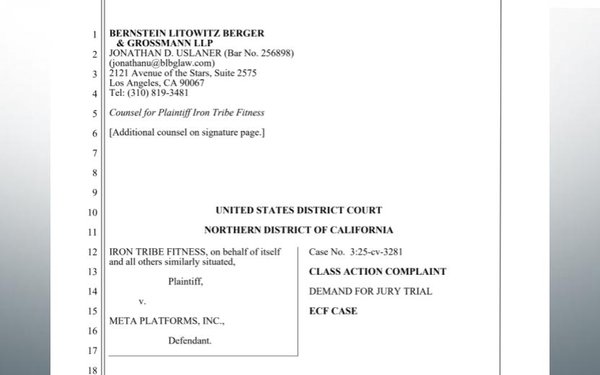
A gym in South Carolina has sued Meta Platforms
for allegedly overcharging Facebook advertisers a collective $4 billion, starting in 2013 and continuing for at least four years.
In a class-action complaint filed late last week, Iron Tribe
Fitness alleges that Facebook failed to honor representations that its auction system “would inherently protect bidders from overbidding.”
The allegations center on Facebook's
system for charging advertisers that submit winning bids in auctions.
Iron Tribe, headquartered in Mount Pleasant, South Carolina, alleges that Facebook purported to use a version of a
“second price” auction system but instead, inadvertently, used a “blended price” system.
The move to a “blended price” system was due to an error in a 2013
software update, according to the complaint.
advertisement
advertisement
In a “second price” auction, the company with the highest bid wins the auction, but isn't charged more than the company with the second
highest bid. But in a “blended price” system, the winning bidder is charged a price between its bid and the bid that came in second.
Iron Tribe alleges that the “blended
price” process resulted in overcharges for two reasons.
“First, Facebook’s process mechanically inflated the prices paid by the winning bidders, because Facebook’s
auction calculations included the winning bids from advertisers when they should have excluded those bids,” the complaint alleges.
“Second, because Facebook purportedly operated a
'second price' auction process, advertisers were incentivized to bid high given the expected protection against overbidding.”
According to the complaint, Facebook was investigating
“pricing irregularities" by 2016, and learned the following year that a line of code introduced in the 2013 software update was “preventing the auction from functioning as
intended.”
The company decided against immediately fixing the code for all advertisers, according to the complaint.
“Facebook determined that simply reverting to a correct
auction process would be so significant that doing so would destabilize the entire Facebook advertisement auction system, and could require disclosure to Facebook investors,” the complaint
alleges.
“Instead of simply correcting the auction process for all advertisers, in order to protect its own interests and prevent discovery of the overcharging, Facebook instead launched
a slow rollout of the correction.”
According to the complaint, Facebook initially fixed the auction for 2% of advertisers, then “gradually expanded the change to 100% of users over
a period of time.”
A Facebook executive allegedly “quantified the impact of that 2013 coding change at '$1B a year.'”
The complaint says counsel for Iron Tribe
learned of the alleged overcharges through his own investigation, including “interviews of former Facebook employees to develop information that was not otherwise publicly available.”
Meta has not yet responded to MediaPost's request for comment.